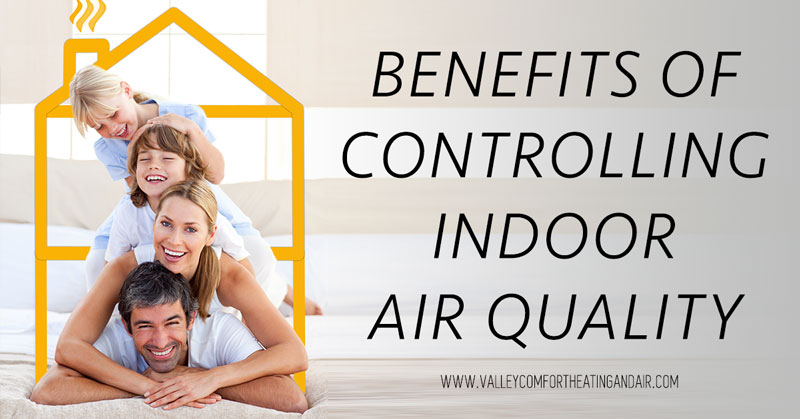Throughout the year, your HVAC (heating, ventilation and air conditioning) system cycles air between the outdoor environment and the interior of your home or business. It’s important to note that this process is not passive. In fact, the operating condition of your HVAC system has a major impact on your indoor air quality. A well-maintained system can help you reap the many benefits of properly controlled indoor air.
How Your HVAC Affects Air Quality
Your HVAC system uses blowers and a network of ducts to heat your home in winter and cool your home in the summertime. However, your system can also potentially act as a point of entry for bacteria, mold and fungi that can cause illnesses, make you feel unusually tired or trigger headaches. As a rule, this happens when moisture traveling through your system provides a suitable environment for the growth of harmful microorganisms in the fiberglass material insulating your ducts.
In an office environment, problems in an HVAC system can also potentially contribute to the onset of a condition known as sick building syndrome. This condition occurs when airborne pollutants, excessive humidity and a range of other factors create generally poor indoor air quality and lead to widespread issues such as contagious illness, eye irritation and skin irritation. In addition to short-term issues, sick building syndrome can produce lasting health problems if you’re exposed to low-quality indoor air for extended periods of time.
The Benefits of High-Quality Indoor Air
When properly monitored and maintained, your home or business HVAC system can contribute to your well-being instead of acting as a source of health problems. This means that you can eliminate or sharply the risk of spreading dangerous microorganisms through your heating and cooling ducts, which in turn helps halt such illnesses as colds, the flu and allergic reactions to mold. In a work environment, you can also make sure that your indoor air doesn’t contain various types of toxic substances, including carbon monoxide, formaldehyde and methane.
Controlling Your Air Quality
In your home, you can promote the benefits of high indoor air quality by regularly replacing the filters in your HVAC system and scheduling a regular HVAC cleaning by qualified professionals. You can increase your safety margin by equipping your HVAC with a microbe-killing UV light. In addition to performing routine HVAC maintenance in a work environment, you can install a monitor specifically designed to continuously check for the presence of carbon monoxide and other toxic gases. The best monitors also continuously check humidity and temperature levels, and help make your HVAC system operate more efficiently.
At home and at work, the benefits of maintaining high-quality indoor air far outweigh the costs of properly maintaining your HVAC system. Contact us for more information on the benefits of routine HVAC maintenance. You can also follow us here for additional advice on effective HVAC solutions.
Frequently Asked Questions
How does an HVAC system impact indoor air quality?
Your HVAC system actively circulates air between indoors and outdoors, affecting indoor air quality. If not maintained, it can become a conduit for bacteria, mold, and fungi, leading to health issues like headaches and fatigue.
What is sick building syndrome, and how is it related to HVAC systems?
Sick building syndrome arises from poor indoor air quality, often linked to HVAC systems that fail to manage airborne pollutants and humidity. This condition can result in symptoms like eye irritation, respiratory problems, and long-term health issues due to prolonged exposure to contaminated air.
What are the benefits of maintaining high-quality indoor air?
Properly maintained HVAC systems can reduce the spread of illnesses like colds and flu by minimizing harmful microorganisms in the air. They also help eliminate toxic substances, such as carbon monoxide and formaldehyde, improving overall health and comfort.
How can I control indoor air quality at home?
Regularly replacing HVAC filters and scheduling professional cleanings can significantly improve indoor air quality. Additionally, installing UV lights can help kill microbes, enhancing safety and air quality.
What specific measures can businesses take to ensure good air quality?
Businesses should perform routine HVAC maintenance and install monitors for carbon monoxide and other toxic gases. These monitors can also track humidity and temperature, ensuring the HVAC system operates efficiently and safely.
Why is it essential to maintain your HVAC system regularly?
maintenance of your HVAC system is crucial for health and comfort. It helps to prevent the buildup of harmful microorganisms and pollutants that can degrade indoor air quality and contribute to health problems.
What are some signs that my HVAC system might be affecting my air quality?
Symptoms like frequent headaches, increased allergies, or respiratory issues, especially in an office setting, can indicate that your HVAC system is contributing to poor indoor air quality.
How can I enhance the safety of my HVAC system?
Equipping your HVAC system with a UV light can kill harmful microbes, while regular inspections can help identify and rectify potential issues, ensuring cleaner air.
What should I do if I suspect my indoor air quality is poor?
If you suspect poor air quality, consider getting your HVAC system inspected and cleaned by professionals, replacing filters, and monitoring air quality with suitable devices.
Where can I get more information on HVAC maintenance benefits?
For more details on the benefits of routine HVAC maintenance, contact your local HVAC professionals or visit specialized websites that offer insights into effective HVAC solutions.



